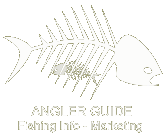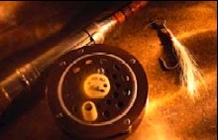There is a
remarkable fishery in Idaho that people very seldom see and few
fly fisherman ever fish. Unlike the Henry's Fork, Silver
Creek or the famous South Fork, very little is ever mentioned and
even less written about it. Everyday hundreds of fishing enthusiasts and tourist
pass it by not knowing it even exist. Not knowing it
provides some of the most remarkable and productive fishing
habitats in Idaho.
Fort
Hall Bottoms, Fly fishing that rivals Henry's Fork and
Silver Creek.
 |
The name of
this fishery is the Fort Hall Bottoms, and it rivals all the
fisheries mentioned above. Located on the Fort Hall Indian
Reservation the Bottoms are impressive. The springs in the area
account for almost 600 billion gallons of water into the Snake
River Basin. The reservation in itself provides
scenic viewing areas for visitors seeking undisturbed wildlife
such as
moose, elk, deer, wild horses and buffalo. The buffalo and wild
horse herds literally number into the hundreds.
The
Native Cutthroat of the Fort Hall Bottoms
 |
The Fort Hall Bottoms fishery numbers are impressive. The average number of fish
per mile is around 2000, but increases dramatically during
spawning.
The spring fed streams and creeks
are ideal for cutthroat and rainbow.
Surprisingly the Fishery states over forty percent of the cutthroats are
larger than twenty inches in length.
But the Bottoms waters weren't always
this fertile. Prior to 1993
the Fort Hall Bottoms suffered from years of unrestricted grazing
and rapid flooding and drafting of American Falls Reservoir.
The cost was loss of bank vegetation, erosion
of stream banks, warmer water temperatures and siltation in spawning
gravels. Since
then restoration enhancement efforts has increased fish population
densities five fold. Stream
depths has increased significantly in targeted areas,
and new areas of clean spawning gravels have been created.
Many areas of
actively eroding bank have been stabilized and revegetated.
A
nice brown taken from Snake River.
 |
But purist who fish these springs and
creeks are blessed with something few blue ribbon fisheries
offer. Seldom may they see another fly fisherman. When the river is
low and clear, the fly fishing is superb, as you wade from bank to
bank, moving up through a series of pools and riffles and crossing gravel bars. Four and five pound cutthroats are routine and now
and then one over ten pounds is caught. About the only time the
Bottoms feel pressure is in late April and May. Reason being
the fishing season opens about a month earlier then that of the other blue
ribbon waters.
You
would think a resource like this would be high profiled and treasured by enthusiasts,
but not the case. The
difficult access, together with strict catch-and-release regulations
and limited permits for non tribal members has given the river a low profile for
Shoshone-Bannock tribe.
Today
the Tribes operate as a sovereign government which provides many
services to Tribal members and non-Indians with revenues from
agriculture, business enterprises, tourism, and other operations.
Species:
Cutthroat,
Rainbow,
Brown
Trout
Hatches: Caddis,
Stoneflies, Leadwing Olive, Gray Drake, Brown Drake, Green Drake,
Pale Morning Duns
Tackle & Gear: For
most fishing on the
Fort Hall Bottoms
an eight to nine foot, four
to six-weight
rod is a good choice.
Season:





